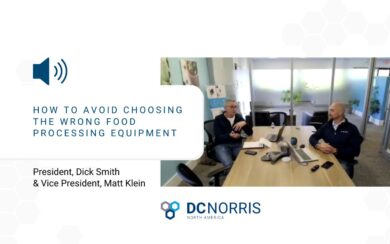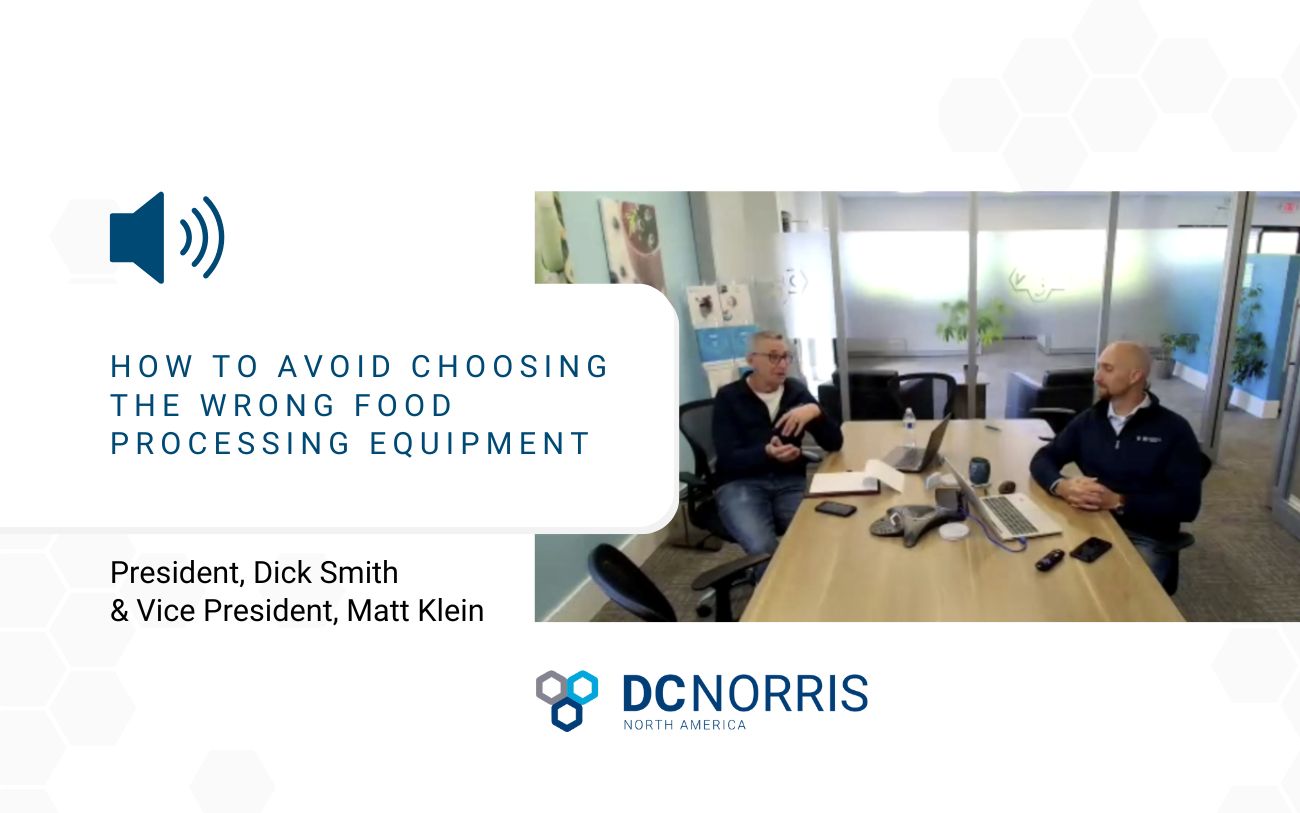 In this conversation, DC Norris North America Vice President Matt Klein and President Dick Smith, alongside Marketing Manager Carly Wujcik, discuss the hidden costs associated with choosing inappropriate food processing equipment. Drawing from their extensive experience, they highlight issues such as unexpected operational costs, equipment inefficiencies, and decreased team morale that can arise from such choices. They emphasize the importance of early operator involvement, initial discovery with clients, and continuous post-sale support. They advocate for sharing comprehensive information early in the process and maintaining proactive communication with clients to optimize equipment performance and minimize costs.
In this conversation, DC Norris North America Vice President Matt Klein and President Dick Smith, alongside Marketing Manager Carly Wujcik, discuss the hidden costs associated with choosing inappropriate food processing equipment. Drawing from their extensive experience, they highlight issues such as unexpected operational costs, equipment inefficiencies, and decreased team morale that can arise from such choices. They emphasize the importance of early operator involvement, initial discovery with clients, and continuous post-sale support. They advocate for sharing comprehensive information early in the process and maintaining proactive communication with clients to optimize equipment performance and minimize costs.
Show Notes:
- 00:00 Speaker Introductions
- 00:33 The Hidden Costs of Choosing the Wrong Equipment
- 01:20 Real-World Examples of Equipment Issues
- 02:08 Importance of Client Communication and Involvement
- 06:10 Operator Involvement in Equipment Selection
- 10:46 Post-Sale Support and Client Relationships
- 14:28 Final Thoughts and Contact Information
- Web Contact Form: www.dcnorrisna.com
- email: mail@dcnorrisna.com
- phone: (231) 935-1519
Navigating the Hidden Costs of Choosing the Wrong Food Processing Equipment
When it comes to food processing, selecting the right equipment is critical not only for efficient production but also for maintaining team morale and fostering long-term client relationships. As highlighted in a recent discussion with industry experts Matt Klein and Dick Smith from DC Norris North America, the hidden costs of choosing inappropriate food processing equipment can have far-reaching implications.
Expert Insights into Avoiding Hidden Costs
Matt Klein, Vice President at DC Norris North America, and Dick Smith, with over 40 years of experience, illuminate the unexpected challenges and costs associated with poor equipment choices. Carly Wujcik, who manages marketing for DC Norris North America, moderated the conversation to gather their insights.
Surprising Costs of Improper Equipment
One common pitfall businesses experience is investing in equipment that doesn’t match their specific needs. Smith cited an example where a company struggled to produce scrambled eggs because its equipment couldn’t discharge the product effectively. Another challenge arose from using a kettle that caused undesirable burn on, which could have been mitigated with the correct steam jacketed kettle choice.
Additionally, Klein highlighted how failing to consider the ongoing cost of operations can create long-term financial burdens. Some clients were drawn by lower initial costs only to face higher running expenses, often overlooked during purchase decisions.
The Importance of Operator Involvement
Both Klein and Smith emphasized the crucial role of involving operators early in the equipment purchasing process. Operators provide unique insights into the day-to-day functioning of machinery, which can help in customizing equipment solutions that are user-friendly and efficient. Unfortunately, many clients hesitate to include operators in initial discussions, missing valuable input that could have improved equipment functionality and user satisfaction.
Team Confidence and Morale
The discussion highlighted that less-than-optimal equipment affects more than just production quality; it can also erode team confidence. Equipment that is too complicated to clean or frequently breaks down can lead to frustration and decreased morale among workers, ultimately impacting productivity.
Creating Collaborative Client Relationships
DC Norris North America prides itself on its proactive client approach, maintaining open lines of communication even post-installation. By working closely with clients, they can provide ongoing support, whether by suggesting upgrades or consulting on process improvements. This collaboration ensures that clients achieve maximum value from their investment, minimizing potential hidden costs.
Recommendations for Prospective Buyers
In selecting food processing equipment, Smith advises sharing as much relevant information as possible while being open to collaborative processes. He reinforces that a successful project leans heavily on the early exchange of knowledge between customers and equipment providers, formalized through confidentiality agreements where necessary.
A Dedicated Team Makes the Difference
The dedication of DC Norris North America to forming long-term client partnerships, alongside their expertise in tailoring processes to client needs, distinguishes them in the industry. As echoed by Wujcik in the discussion, the opportunity for clients to interact directly with experts like Matt Klein and Dick Smith ensures personalized service and maximum equipment efficacy.
For those considering a new equipment purchase, the key takeaway is clear: involve your operators early, engage openly with experts, and prioritize long-term value over short-term savings. These strategies can significantly mitigate the hidden costs associated with unsuitable equipment choices.
Contact us to discuss your setup and tailor a solution for your specific needs.



